|
|
|
Sort Order |
|
|
|
Items / Page
|
|
|
|
|
|
|
| Srl | Item |
| 1 |
ID:
145783
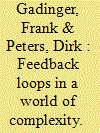

|
|
|
|
|
| Summary/Abstract |
Feedback in foreign policy occurs when a state's foreign policy affects the international context of that state and those changes in context subsequently impact on the state's future foreign policy decisions. In this way, feedback loops can develop, which may become self-reinforcing and in which foreign policy and international context continuously affect each other. Even though such processes are ubiquitous especially in a globalized world, they have hitherto received little systematic attention. We introduce cybernetics as a perspective that puts such feedback effects at the centre of attention and provides an accessible sequential framework for analysing them. Such a cybernetic analysis not only demonstrates the significance of feedback processes in foreign policies but also speaks to several recent debates in international relations theory and foreign policy analysis. In particular, it highlights processes of learning and change, of non-linearity and indeterminacy, and enables the researcher to integrate insights from structure- and agency-based approaches. We outline the merits of a cybernetic analysis by discussing the effects of feedback in the United States' War on Terror.
|
|
|
|
|
|
|
|
|
|
|
|
|
|
|
|
| 2 |
ID:
147938
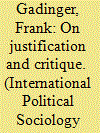

|
|
|
|
|
| Summary/Abstract |
Luc Boltanski is one of the most important contemporary social theorists. Whether and how his sociology matters for International Relations (IR) theory has, so far, not been explored. Boltanski’s work, as this article demonstrates, can greatly advance international political sociology by further developing a practice theoretical account which reconciles Bruno Latour’s Actor-Network Theory and Pierre Bourdieu’s praxeology. Boltanski’s pragmatic sociology is mainly inspired by pragmatism and ethnomethodology, but it is still concerned with sociology as a critical project of emancipation. He aims to renew critical sociology by focusing on the ‘critical capacities’ ordinary actors use in disputes and controversies of political life. Practices of justification and critique as triggers of conflicts and sources of agreements are consequently the subjects of analysis. This implies, furthermore, a strong notion of normativity in practice, which reveals a blind spot in current debates in IR. Justification becomes a social practice through which diverging legitimacy claims are tested under conditions of uncertainty. Such a view is conceptually and methodologically relevant for IR scholars interested in contested norms, moral ambiguity, and the fragile character of political reality. Considering Boltanski’s work broadens the empirical scope of practice theory and provides promising new directions for IR theory.
|
|
|
|
|
|
|
|
|
|
|
|
|
|
|
|
| 3 |
ID:
141845
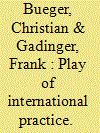

|
|
|
|
|
| Summary/Abstract |
The core claims of the practice turn in International Relations (IR) remain ambiguous. What promises does international practice theory hold for the field? How does the kind of theorizing it produces differ from existing perspectives? What kind of research agenda does it produce? This article addresses these questions. Drawing on the work of Andreas Reckwitz, we show that practice approaches entail a distinctive view on the drivers of social relations. Practice theories argue against individualistic-interest and norm-based actor models. They situate knowledge in practice rather than “mental frames” or “discourse.” Practice approaches focus on how groups perform their practical activities in world politics to renew and reproduce social order. They therefore overcome familiar dualisms—agents and structures, subjects and objects, and ideational and material—that plague IR theory. Practice theories are a heterogeneous family, but, as we argue, share a range of core commitments. Realizing the promise of the practice turn requires considering the full spectrum of its approaches. However, the field primarily draws on trajectories in international practice theory that emphasize reproduction and hierarchies. It should pay greater attention to practice approaches rooted in pragmatism and that emphasize contingency and change. We conclude with an outline of core challenges that the future agenda of international practice theory must tackle.
|
|
|
|
|
|
|
|
|
|
|
|
|
|
|
|
| 4 |
ID:
171919
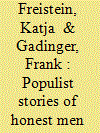

|
|
|
|
|
| Summary/Abstract |
This article proposes the methodological framework of visual narrative analysis through the study of images and narratives. We are interested in the appeal of political storytelling. In applying an approach of layered interpretation, we study images and slogans to consider the more complex underlying narratives in their political and cultural context. Our exploratory case studies draw on material from right-wing populist parties, namely election campaign posters from Germany and the UK as material for the analysis. We find that narratives operate with a ‘fantasmatic logic’, which adds fantasy to politics, to depoliticise and camouflage their radical intent and gain approval by making consent desirable. We identify two exemplary narratives (honest men under threat; proud mothers) that entrench traditional gender roles in accordance with patriarchy and nationalism. Theoretically, our approach contributes to debates in IR on cultural underpinnings in international politics and the construction of collective identities through shared/divided narratives. Visual narrative analysis provides a promising methodological tool for analysing visual representations in their productive relationship with text. This perspective foregrounds the power of political storytelling through fantasmatic appeal and fosters a better understanding of the global rise of populism.
|
|
|
|
|
|
|
|
|
|
|
|
|
|
|
|
| 5 |
ID:
076499
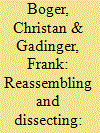

|
|
|
|
|
| Publication |
2007.
|
| Summary/Abstract |
What does it take to be an international relations (IR) scholar? IR discourses have tackled this question with focus on very different problems: the role and function of IR scholars for policy; the (ir)relevance and impact of IR knowledge and expertise in world politics; disciplinary history; or in studying IR's institutions. We argue that all these "disciplinary sociology" debates struggle with the relation between an internal scientific IR world and an external social context (policy, society). We reject this distinction and argue that science studies can help us to address these problems more adequately by treating IR as a scientific practice that is closely tied to its social environment. The article sets out to explore science studies' possible contributions. Based on science studies key assumptions, we develop a heuristic by which the relations between IR and its environment can be grasped systematically. From this perspective, IR is pivotally a culture constituted by different domains of practice. Hence, understanding IR scholars in "doing IR" requires taking into account their daily and sometimes trivial practices. For instance, writing an article in IR means much more than only thinking theoretically at a desk. We systematize the different domains of practices as the articulation of knowledge claims, mobilizing the world, autonomy seeking, alliance building, and public representation. "Being an IR scholar" and "producing IR knowledge" depends inevitably on these sets of practices and IR is intrinsically interwoven with its environment through these.
|
|
|
|
|
|
|
|
|
|
|
|
|
|
|
|
| 6 |
ID:
178503
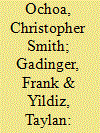

|
|
|
|
|
| Summary/Abstract |
Current debates about surveillance demonstrate the complexity of political controversies whose uncertainty and moral ambiguities render normative consensus difficult to achieve. The question of how to study political controversies remains a challenge for IR scholars. Critical security studies scholars have begun to examine political controversies around surveillance by exploring changing security practices in the everyday. Yet, (de)legitimation practices have hitherto not been the focus of analysis. Following recent practice-oriented research, we develop a conceptual framework based on the notion of ‘narrative legitimation politics’. We first introduce the concept of ‘tests’ from Boltanski's pragmatic sociology to categorise the discursive context and different moral reference points (truth, reality, existence). Second, we combine pragmatic sociology with narrative analysis to enable the study of dominant justificatory practices. Third, we develop the framework through a practice-oriented exploration of the Snowden controversy with a focus on the US and Germany. We identify distinct justificatory practices in each test format linked to narrative devices (for example, plots, roles, metaphors) whose fluid, contested dynamics have the potential to effect change. The framework is particularly relevant for IR scholars interested in legitimacy issues, the normativity of practices, and the power of narratives.
|
|
|
|
|
|
|
|
|
|
|
|
|
|
|
|
|
|
|
|
|